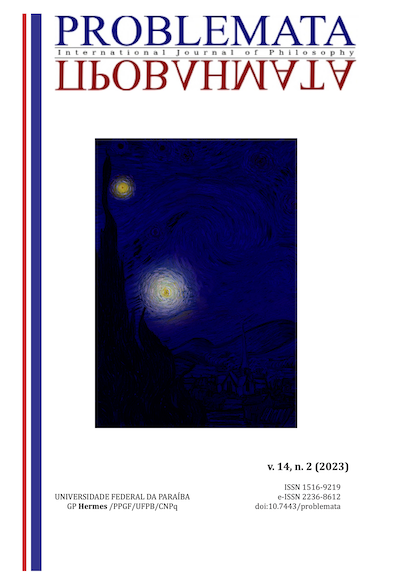THE RELATIONSHIP BETWEEN THE STATE, INDIVIDUAL LIBERTY, AND THE PRINCIPLE OF DAMAGE IN STUART MILL'S PHILOSOPHY
DOI:
https://doi.org/10.7443/problemata.v14i2.66969Keywords:
Stuart Mill, Freedom, The Harm PrincipleAbstract
In this article, we analyze the right to individual freedom and its limitations in the light of Stuart Mill's philosophy, especially in the work On Liberty (1859). The first part of this paper presents the arguments raised by the philosopher towards the defense of the Harm Principle, which justifies the restriction of individual freedom, when one's action produces some damage to another person. Thus, for the right to freedom to be equally effective, it is necessary to limit the actions that may cause harm to other individuals. The second part of this work emphasizes the importance of cultivating individuality, which is given through freedom, since it is by means of the development of individual singularity that society becomes plural, diverse, and valuable. The last part of this article addresses the role of the State with regard to guaranteeing the right to freedom, which requires ensuring the Harm Principle. The State, therefore, has the right and the duty to regulate the exercise of individual freedom, in order to avoid and prevent harmful actions, since this is a fundamental condition for the equal effectiveness of the right to freedom for all.
Downloads
References
ALVES, Rodrigo Vitorino Souza. Sobre a liberdade: indivíduo e sociedade em Stuart Mill. Revista CEPPG. Catalão, n. 25, p. 197-212, jul./dez. 2011.
BAVARESCO, Agemir; SANTOS, João Vitor Freitas dos; KONZEN, Paulo Roberto. Princípio da utilidade e liberdade de expressão e de informação, em Sobre a liberdade, de J. S. Mill. Revista Ágora Filosófica. Recife, v. 1, n. 1, p. 7-47, jan./jun. 2012.
BRUGGER, Walter. Dicionário de filosofia. Tradução de Antônio Pinto de Carvalho. São Paulo: ed. Herder, 1962. 703 p.
FELDMANN, Alfeu José. A liberdade individual e a autoridade na sociedade na obra “Sobre a Liberdade” de John Stuart Mill. 1999. 55 f. Tese (Graduação em Filosofia) – Curso de Filosofia, Instituto de Filosofia e Teologia Santa Maria, Santa Maria.
LOCKE, John. Segundo tratado sobre o governo civil: ensaio sobre a origem, os limites e os fins verdadeiros do governo civil. Tradução de Magda Lopes e Marisa Lobo da Costa. Petrópolis: Vozes, 1994.
LOPES, Nelzeli Moreira da Silva. A liberdade individual e suas limitações, à luz do pensamento de John Stuart Mill. Revista Eletrônica Direito e Política. Itajaí, v. 3, n. 3, p. 759-770, jul./set. 2008. Disponível em: https://siaiap32.univali.br/seer/index.php/rdp/article/view/7350/4185. Acesso em: 02 nov. 2019.
MACIEL, Everton Miguel Puhl. Liberdade de pensamento e discussão no liberalismo de John Stuart Mill. Revista Reflexões. Fortaleza, n. 11, p. 250-262, jul./dez. 2017. Acesso em: 20 nov. 2019.
MILL, John Stuart. O utilitarismo. Tradução de Alexandre Braga Massella. São Paulo: Iluminuras, 2000.
MILL, John Stuart. Sobre a liberdade. Tradução de Alberto da Rocha Bastos. 2. ed. Petrópolis: Vozes, 1991.
NWORA, Emmanuel Ifeka. Liberdade do indivíduo versus autoridade do estado na filosofia política de John Stuart Mill. 2010. 121 f. Tese (Mestre em Filosofia) – Faculdade de Filosofia, Universidade de Brasília, Brasília.
TORRES, Iraildes Caldas. Poder e Liberdade em Stuart Mill: a inclusão das mulheres nesse debate. Disponível em: https://revistas.pucsp.br/pensamentorealidade/article/view/8506/6310. Acesso em: 02 nov. 2019.
ZART, Alfredo Fernando. A liberdade em John Stuart Mill. 2016. 91 f. Tese (Mestre em Direito) – Faculdade de Direito, Universidade Federal do Rio Grande do Sul, Porto Alegre.
Downloads
Published
Issue
Section
License
Copyright (c) 2023 Douglas Orben, Douglas Kaefer Klug

This work is licensed under a Creative Commons Attribution 4.0 International License.
Authors who publish with this journal agree to the following terms:
- Authors retain copyright and grant the journal right of first publication with the work simultaneously licensed under a Creative Commons Attribution License that allows others to share the work with an acknowledgement of the work's authorship and initial publication in this journal.
- Authors are able to enter into separate, additional contractual arrangements for the non-exclusive distribution of the journal's published version of the work (e.g., post it to an institutional repository or publish it in a book), with an acknowledgement of its initial publication in this journal.
-
- Authors are permitted and encouraged to post their work online (e.g., in institutional repositories or on their website) prior to and during the submission process, as it can lead to productive exchanges, as well as earlier and greater citation of published work (See The Effect of Open Access).





